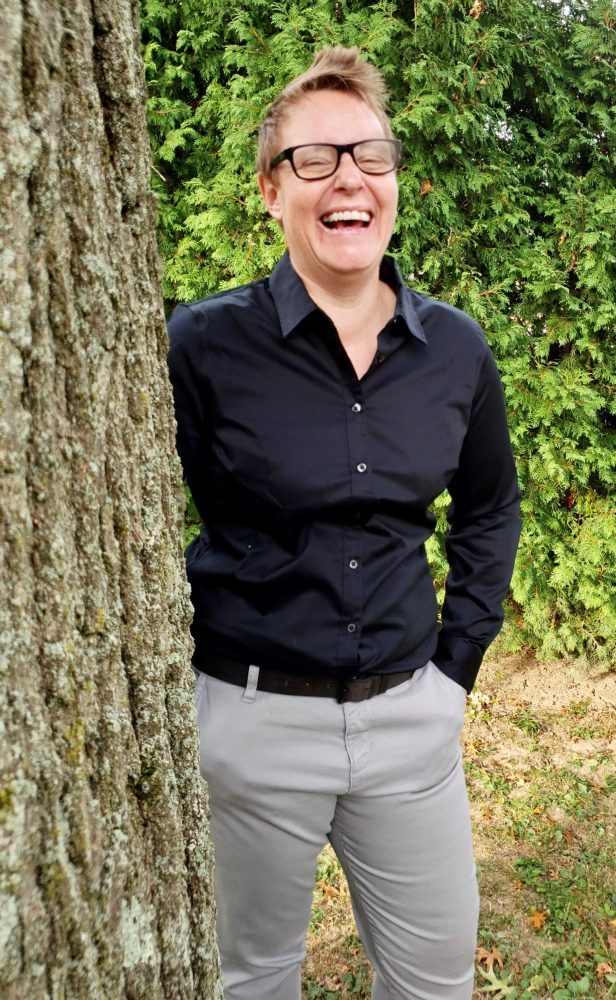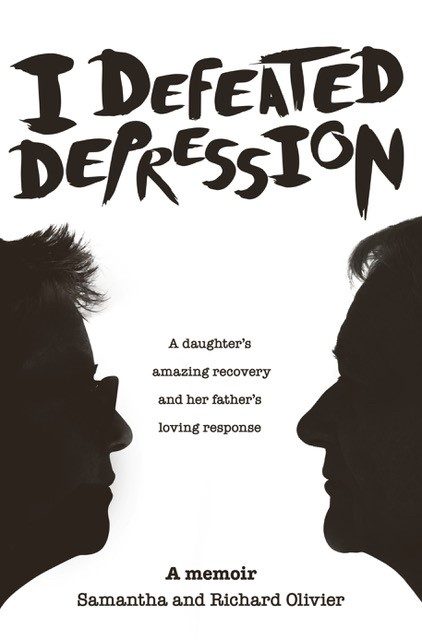Having been bullied at School because of her sexuality she spiraled into Depression and battled with this insidious disease for over 20 years.
Recounting in painful detail her 30 year journey through anxiety and clinical depression Sammie describes her rollercoaster life, which culminates in her ability now in her forties to manage her condition so that she is happier than she has ever been.
Having been bullied at school after coming out, through a series of failed relationships and an inability to hold down office jobs, she describes her suicide attempts with painful candour. Eventually, she finds solace in the company of dogs, which leads to a fulfilling life in America with a successful job and a community of wonderful friends.
And in an inspired twist on the oft-told tale of depression, her father Richard responds with how he and his wife supported Sammie, helping her both emotionally and practically to finally defeat this insidious disease.
A highly personal and ultimately uplifting memoir that should be read by anyone affected by or coming to terms with depression.
We sit down with Sammie Olivier and discuss her journey:
At what age did you realize you might be gay? And were you immediately accepting of it?
Sammie: I was aware at the age of 15 that I was different to my peers. But I wasn’t able to comprehend that the difference was in sexual attraction. And to be honest with you I did everything I could NOT to be gay, but as anyone knows it is not something you can choose to do or not. I was craving the ‘normal’ family life of a husband, 2.4 children, a dog and vacation once a year and accepting that my sexuality would at the time mean I would not have these things. Fortunately times have changed now and all of those things are now possible.
Was there a particular moment that confirmed it for you?
Sammie: The first time I kissed a girl was when I was 18 years old and we were outside a night club in Manchester, England. It was then that I realized there was no alternative. It was literally like fireworks going off and I could suddenly comprehend why my college buddies talked about their boyfriends much of the time.
Having suffered from Clinical Depression for many years, did your sexuality contribute to this?
Sammie: Yes, absolutely, it had a large part to play. I truly believe that Depression is partly genetic and also environmental. My mother had Post Natal Depression and was hospitalized and her father also had a diagnosis. My mum had struggles with some aspects of parenting and so that, coupled with being bullied at school, were the main factors in my own diagnosis.
When were you diagnosed and to what extent did it effect your life?
Sammie: I was officially diagnosed in November 2004 but had suffered without a formal diagnosis for several years prior to this. It had manifested itself in anxiety and panic attacks and thoughts of wanting to end my life. The panic attacks were the first symptom. But when I could no longer maintain the physical pressure brought on by the Fight or Flight response, I believe that was when I developed depression, so I guess it kind of went from my body to my brain.
At the peak of my illness in 2005 I was checked in to a clinic in North London for psychiatric treatment as my life was in danger. It was an outpatient appointment I attended with my stepmother that led to my hospitalization. I finally had the courage to tell someone I wanted to end my life; it was terrifying at the time to say those words out loud, but I knew I had to in order to get the help I needed. Now by sharing my story, I hope to make it easier for people to say those words so they can get the appropriate help. The words depression and suicide are taboo, aggressive words so we suppress them to save our loved ones from further hurt. What I want to do now is make it okay to say you are suicidal. Parents, teachers and carers need to let people know it is okay to say those words and I think this is done by asking the question ‘Do you want to end your life?’
At that time, being suicidal consumed every area of my life. I was unable to see outside my own head. It was selfish in that it took away my ability to see and feel anything positive in my life, including the love and support from my family and friends and even the sun in the sky. I didn’t have the ability to feel anything other than the dark misery that was in my head.
With the desperation to feel anything while in the clinic I resorted to holding my hand under the hot water from the drinks machine, which as a result was soon turned off and a note placed saying it was out of order. The only thing it achieved for me was burns on my hands and arms.
You say you have fully recovered from depression and are now living a fulfilled and happy life! How did you accomplish that?
Sammie: I had to hit my rock bottom before I could make my way back up. Having tried to end my life many times and not being able to see it through, I quite literally gave up trying and realized that perhaps it just wasn’t my time. I’m not a religious person and so I put this down to the universe. As I started to see light, I really wanted to explore my feelings and emotions and figure out what it was that was making life bearable again. And so, on my way back up from the bottom I decided to learn, and I realized that having an opportunity was instrumental to the improvement in my wellbeing. I now constantly apply that in order to maintain my well-being. Even in the most of traumatic circumstances you will be able to find an opportunity, you just have to search for it.
You recently wrote your memoir published in October 2019 by Mirador Publishing. Can you tell us about that?
Sammie: Absolutely. I am now mentally and physically in the best shape of my life. Three years ago I came to the realization that I was able to verbalize not only what I went through but also articulate the tools of my success and how I maintain my sense of wellbeing. From the very beginning the book I Defeated Depression has only ever been about helping other people. If I can reach just one person who after reading it says, ‘today I am not going to end my life’, then I will have achieved what I set out to do.
This book has been the most amazing project. One of the reasons is that what makes it different to others in the same genre is that my Dad, who is the co-author, writes his response to my story from the perspective of the parent and so he describes how my illness and recovery affected him and the family. As a result, it has brought us all even closer.
I’m finding that even with complete strangers the book brings an immediate emotional connection between two people who talk about it. It is doing exactly what I wanted it to and that is getting people to talk more openly about depression and suicide.
As we come to the end of our interview, what words would you like our readers to be left with?
Sammie: Firstly, search for the opportunity in everything in your life. It might be that you will have more time, more money, different priorities as a result of a traumatic event. Take the opportunity, use it for all its worth and run with it. If you are struggling to find it there is always the opportunity to learn, and that way you will be better equipped for the next challenging event.
Secondly, surround yourself with good, kindhearted people. My circle of friends is small, but they inspire and motivate me to be the best version of myself every day.
Depression thrives on the ‘what ifs,’ in other words the stuff that hasn’t yet happened. Put that in the trash and deal only with the information you have at that moment.
If you are feeling suicidal please tell someone, don’t be afraid to use those words.
Finally, if you can take a walk outside and really be in the moment you will benefit. Exercise is medically proven to help with the symptoms of depression, and it is key to my wellbeing.
I now know what my brain is capable of and so every minute of every day my mental health is a priority because without it I have nothing. But now I can truly say that I have defeated depression.

